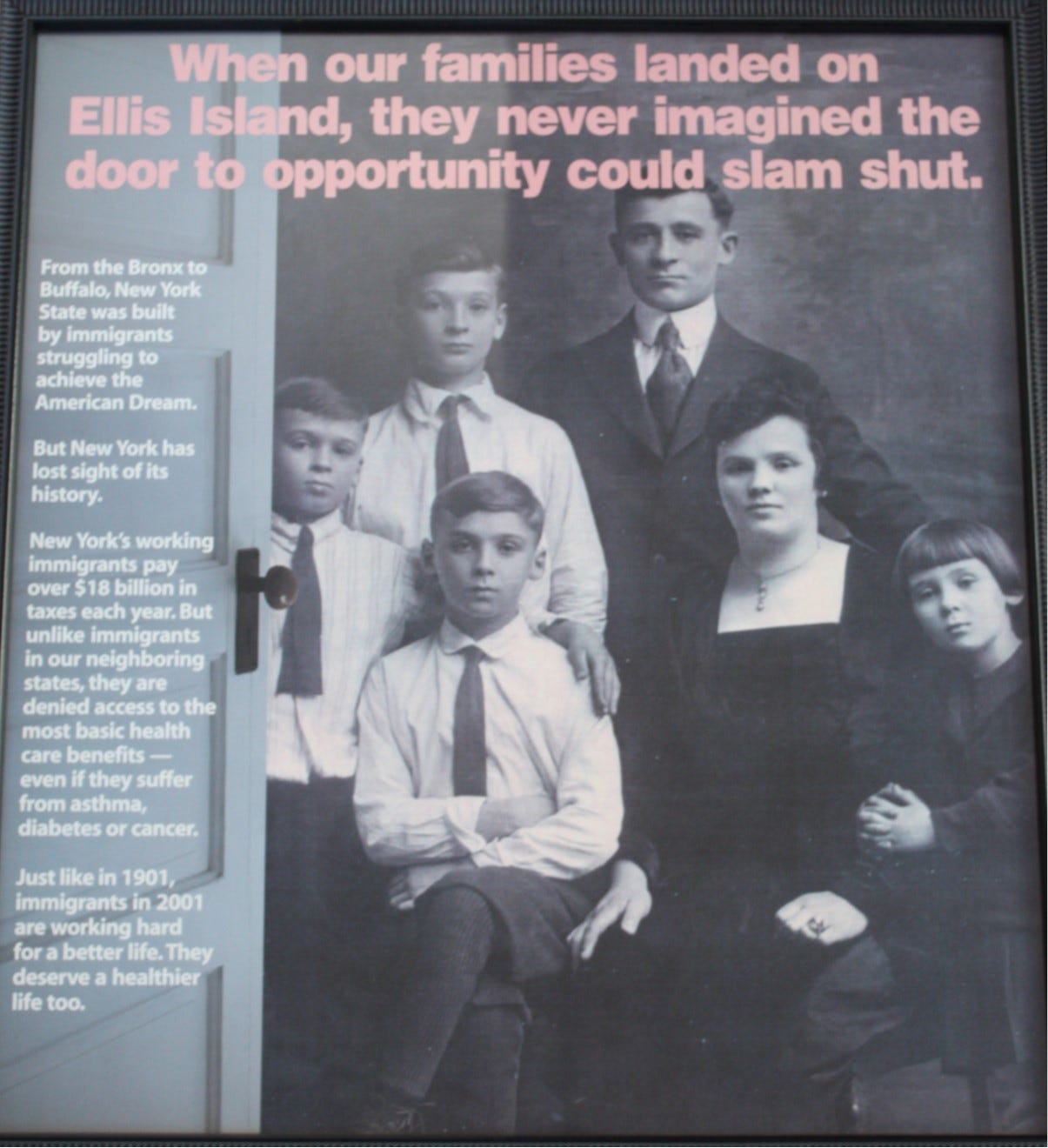A few years ago, in another blog post, I shared a photo of this poster that hangs in my office:

“When our families landed on Ellis Island, they never imagined the door to opportunity could slam shut.”
It’s a reminder of the role immigrants have played throughout New York’s history. Immigrants are part of the fabric of our communities and contribute to the rich diversity of our State. And New York has played a special role in welcoming so many immigrants and refugees.
Although this poster was produced nearly 20 years ago, its message couldn’t be timelier. A seemingly endless stream of federal policies are hostile to our nation’s immigrants and refugees. Some examples:
- The public charge rule, which takes effect today, will prohibit immigrants from receiving legal status if they receive assistance through public benefits including Medicaid, Supplemental Nutrition Assistance Program (SNAP), or housing. This rule has already had a chilling effect on immigrants seeking services, and its implementation will surely lead to losses of health insurance coverage, inefficiencies in care, and a negative economic impact in New York State and across the country.
- An expanded travel ban enacted on Friday suspends visa programs for immigrants from an additional six Asian and African countries, on top of the seven countries covered by the 2017 ban.
- For 2020, the number of refugees to be resettled in the U.S. has been capped at 18,000 — down from 85,000 in 2016, and by far the lowest number since the refugee resettlement program was introduced 40 years ago. New York State welcomed just 1,600 refugees last year, compared with 5,800 refugees in 2016.
When the federal government fails us, it is up to states and communities to step in. That’s what is happening. Across New York State, advocates, community leaders, health care providers, and others are working to support immigrant families and provide needed services during this challenging time. Some examples of a better kind:
- The New York Immigration Coalition (NYIC) is fighting the public charge rule and educating people on what it means for New York’s immigrant families. Community-based organizations, social service providers, and immigration attorneys are using and sharing NYIC’s analyses and resources with their clients to ensure that they have accurate, up-to-date information. And NYIC is working to develop solutions that make it easier for immigrants to meet the new requirements. For example, what more can New York do to help ensure that prospective immigrants can prove they will have health insurance within 30 days of their arrival?
- As more immigrants are being detained by Immigration and Customs Enforcement, New York Lawyers for the Public Interest (NYLPI) has documented life-threatening health care conditions for immigrants being held in detention centers: denials of treatment, delayed surgeries, missed diagnoses, and other medical errors. For example, one detained immigrant reported, “I only got to see the doctor once for the three months that I was detained. I was diagnosed with hemophilia and Hepatitis C and was given no treatment for it.” NYLPI is fighting for improved conditions in detention facilities and helping individual clients get the care they need, working with an extensive network of volunteer medical providers.
- Similarly, Physicians for Human Rights (PHR) works with clinicians to provide evaluations and advocacy in asylum cases. These medical volunteers evaluate and provide documentation of the physical and psychological effects of persecution, violence, and human rights violations, and play an important role in corroborating asylum-seekers’ accounts of their experiences in their home countries. PHR recently introduced a new model that makes medical schools throughout New York State (which has the second-highest number of asylees among all states) the hubs for training and evaluations.
There are broad policy options available too. For example, the State could expand access to health coverage for immigrants. One solution, developed by the Community Service Society, would establish universal coverage for young adults. For those who don’t qualify for other types of coverage, the State could expand the Child Health Plus program to all young adult immigrants through age 29. This policy change could cover an estimated 27,900 New Yorkers.
I don’t expect the onslaught of anti-immigrant federal policies to stop soon. And even then, we can’t rely exclusively on solutions to emerge from Washington. Immigration policy has long been among the most controversial topics for Congress. So, it’s up to us as New Yorkers to maintain our heritage as a place that opens its arms to people from around the world. It’s up to us to ensure they can lead healthy and productive lives. We can and must keep the door open to opportunity.
By David Sandman, President and CEO, New York Health Foundation
Published in Medium on February 24, 2020


